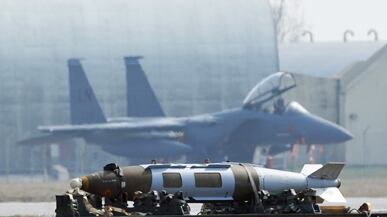The Mideast is awash now in popular awakenings, always in oil and, often overlooked, in arms. States like Israel, Saudi Arabia, and the United Arab Emirates have jet fighters and rockets to rival or exceed the conventional military muscle of European powers like Britain and France. And Mideast states are buying more firepower over the next four years, with totals approaching $123 billion for U.S. sales alone. Of this, the Saudi share could be upward of $60 billion for even more front-line aircraft and missiles, making it the largest U.S. arms sale in history.
The Libyan government is fighting NATO today with the very arms eagerly and recently sold by Italy, France, and Britain, when these allies chose to look upon Col. Muammar Gaddafi as a tolerable weirdo, a reliable supplier of oil, and a good arms customer. Iran, of course, with its missile arsenal and its open arms pipeline to radical groups like Hezbollah and Hamas, serves as principal reason for most Western arms sales. Despite all the nightmares that can be conjured from these growing arsenals, Western policymakers reckon otherwise. They feel that their arms sales do far more good than harm—and they're probably correct, at least for the foreseeable future.

One big reason is money. Sure it sounds crass, but arms sales are quite profitable, and a partial but consequential offset for those high-flying oil bills. Business is business, after all. The Arab oil states sell Europe and America oil at exorbitant prices, and the big weapons producers—the United States, Britain, France, Russia, and now even China—sell weapons to Arabs at equally exorbitant rates. Arms bills don't begin to offset oil bills, but everything helps. The $60 billion Saudi bonanza would likely guarantee 77,000 high-paying jobs in America, according to one estimate.
Nor do Western policymakers believe that their arms sales have proved to be matches to light waiting Mideast conflagrations. Indeed, they think the contrary. Apart from Saddam Hussein's attacks on Iran and Kuwait many years ago, they calculate that their arms sales have helped keep the peace by maintaining various balances of power. The calculus in Washington, for example, is that the massive sales to states on the Arabian Peninsula like Saudi Arabia, Kuwait, the United Arab Emirates, and Oman, as well as sales to Egypt, contribute to deterring Iran. That is the main justification for the sales by the State Department. It is backed up by the judgment of regional experts who say Iran is well aware that America's Sunni Arab allies on the Arabian peninsula have clear air and missile superiority in the Gulf.
U.S. officials are also ever mindful, as if they could be otherwise, of the effect of these new weapons in Arab hands on Israel's security. Over the years, U.S. administrations have gone ahead with sales to Arab states, despite Israeli objections. At other times, they've gone ahead, but with suitable compensation to Israel in order to maintain its technological and operational superiority. Thus, with more updated F-15 fighters heading to Saudi Arabia, the United States will do Israel one better by selling it even more advanced F-35 fighters. To some degree as well, Israelis calm themselves by being the region's only producer of front-line military equipment. While Israelis can never rest easy, they know they possess overall conventional force superiority, not to mention nuclear weapons.
Western leaders are confident they can handle the Mideast problems of the past—but much less so the possible consequences of the new popular awakenings.
Thus, Western leaders are confident they can handle the Mideast problems of the past—but much less so the possible consequences of the new popular awakenings, the Arab Springs or democratic revolutions. For sure, most Western leaders initially saw what they wanted to see and what they hope will happen: transitions that might result in stable democracies over time as Arabs come of political age. Second looks, however, revealed strong possibilities that America's autocratic friends would crack down even harder against the protesters, as in Bahrain and by the conservative army in Egypt. Not to be forgotten, these crackdowns would be enabled by Western arms. Third looks created even greater alarms. Specifically, fears are rising that while democrats may be toppling autocrats and opening the door to a better future, real power might be flowing to religious extremists. The concrete concern now is that elections in countries like Egypt are likely to throw power to the best organized political groups, which are not the young democrats but the far better organized Muslim Brotherhood and its allies. It obviously doesn't sit well to contemplate high-powered modern armaments in the hands of such groups. Saudis and Israelis could also agree on that.
Americans don't feel comfortable with arms sales, never have. They don't like thinking of themselves or having others think of them as merchants of death. To this point, however, Washington policymakers have no trouble standing up to the merchant of death image. As far as they can see, their arms sales help keep the peace by maintaining three essential balances of power: Among Arab states, where none has the cause or the might to start wars; between Arab states and Israel, where Israel has clear force superiority; and between Israel and Arab states on the one side, and Iran, on the other, where states friendly to Washington clearly have the upper hand. Western nightmares come from their hopes for Arab democracy and their fears that fledgling Arab democracies will go awry. In a highly volatile region of the world, brimming with modern arms, that's what keeps them awake at night.
Leslie H. Gelb, a former New York Times columnist and senior government official, is author of Power Rules: How Common Sense Can Rescue American Foreign Policy (HarperCollins 2009), a book that shows how to think about and use power in the 21st century. He is president emeritus of the Council on Foreign Relations.






